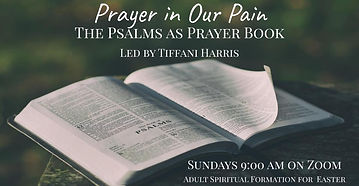CLASSES
Online Resources for current and past classes.
The Spirituals and the Blues
A study in the book by James Coney
Lead by Barry Harvey
2021 Lenten Formation
“I am the blues and my life is a spiritual. Without them, I cannot be.” These words of James Cone, one the most influential African-American writers over the last fifty years, come from the introduction to his book The Spirituals and the Blues. Cone describes how black Christians responded to their suffering and expressed their hope through these musical forms. During the season of Lent we shall read through this powerful work, opening ourselves to what Dietrich Bonhoeffer calls “an experience of incomparable value…to see the great events of world history from below, from the perspective of the outcast, the suspects, the maltreated, the powerless, the oppressed and reviled, in short, from the perspective of the suffering.” Though Cone uses the spirituals and blues to tell the story of the faith of sisters and brothers in Christ as they endured slavery, Jim Crow, and racial inequities and indignities, technical musical knowledge is not required.
After Egypt: A Study in Exodus
Lead by Dennis Tucker and Christina Gibson
2021 Lenten Formation
The book of Exodus paints the journey of God’s people in which YHWH radically delivers Israel from their oppression and slavery in Egypt and covenants to bring Israel to a place of their own. The narrative shows the power, protection, and presence of the God who rescues and redeems.
Learning to Walk in the Dark
An Epiphany Study in the book by Barbara Brown Taylor
Lead by Brett Gibson
2021 Epiphany Formation
Barbara Brown Taylor’s book Learning to Walk in the Dark seeks to reorient our posture toward the darkness we inevitably encounter in life. In an age and culture that seems addicted to what she calls “full solar spirituality,” Taylor, with help from Christian mystics through history, guides us toward a “lunar spirituality,” one that not only learns not to fear the darkness, but that embraces the gift of God in Christ in the darkest moments of life.
Prayer in our Pain:
Psalms as Prayer Book
Lead by Tiffani Harris
2021 Easter Formation
At some point in our lives, we all will experience significant pain, be it physical or emotional. Suffering is part of what it means to be human. The Psalms reflect our humanness as they voice the joys and sorrows of our lives while drawing us to recognize the Good Shepherd among us. We will explore the Psalms as prayer book, paying close attention to suffering and pain in prayer. No text is required, however, reading the assigned Psalm for the week will be helpful.
Check back here each week to view the class recordings.
Shalom and the Community of Creation
A study in the book by Randy Woodley
Lead by Chase Jensen
2021 Easter Formation
Join us as we continue exploring how we might understand creation - and how to live well in it - by learning from a respected teacher on the subject. Dr. Randy Woodley is distinguished associate professor of faith and culture and director of indigenous and intercultural studies at George Fox Seminary. A Keetoowah Cherokee, he has ministered among First Nations people for over twenty-five years and is the cofounder of Eagle’s Wings Ministry. We will engage Dr. Woodley’s writing and also consider the ways we have been taught to relate with creation.
Confronting Racism as Spiritual Practice
An honest look at the church's role in the history of racism in America.
Elise Edwards
2020 Summer Formation
Spiritual growth involves helping us to see ourselves as who we are, not just who we wish to be or try to be. Many of us are already doing this work in our spiritual lives and know that the Christian life is an ongoing process of sanctification. Many of us already use tools and resources like scripture reading, the enneagram, spiritual direction, and centering prayer for spiritual growth. We try to face our sins and examine them, trusting that the Holy Spirit doesn't ask us to do this so that we may be condemned or assaulted by guilt and shame. Rather, we acknowledge our sins because we are enslaved to sin, and the power of Christ allows us to be transformed and renewed and healed.
This study on confronting racism adopts this confessional, transformation-oriented approach. Racism is an evil and a kind of sin that we have internalized. It's time for us to confess and repent so that we can be truly transformed.
If Christians are to confront racism sincerely, there are some questions we must ask:
--How has the American church, as an institution, been complicit in racism?
--How might we begin to address this in our worship, teaching, polity, and practices?
We also seek to discern what actions we might take, individually and corporately, to address the systemic racism that is so much a part of our society.
Christ in Creation
How does Christ relate to creation?
Lead by Joshua King
2020 Fall Formation
Many modern Western Christians have imagined him (after resurrection) above creation, reaching down into our hearts to work a drama of salvation for which "nature" provides a stage (one day to be left for heaven). Yet the biblical witness and much of Christian tradition envision Christ in creation, holding it together, entering its suffering bodily, reconciling all of it—not only humans—to God. Could such a vision inform how we see ourselves as the body of Christ now? What would it mean for our worship? How could the arts help us reawaken to Christ's presence in creation? How might we join Christ's work of reconciliation in a world in which ecological, racial, and economic injustice are inseparably linked? These are some of the issues we'll consider together.















